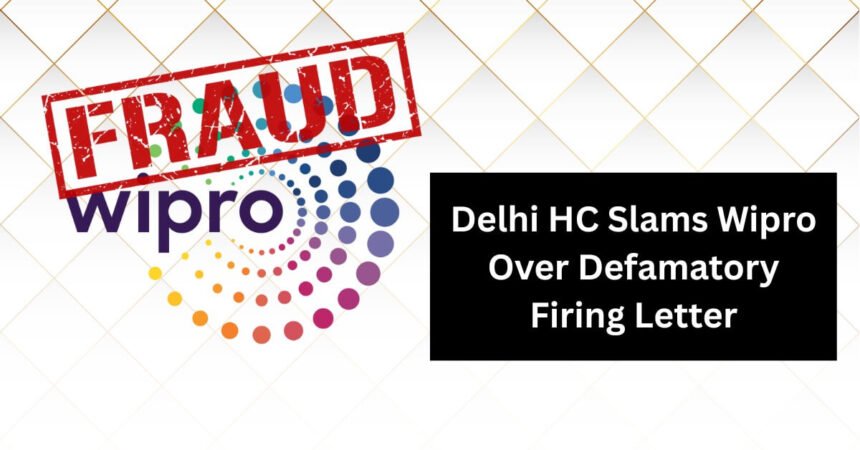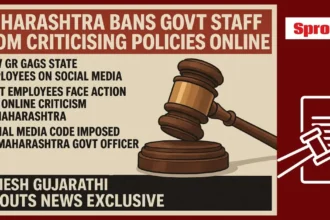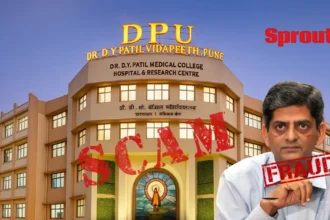Delhi HC Slams Wipro Over Defamatory Firing Letter
• Wipro to Pay ₹2 Lakh for Tarnishing Employee’s Image
• Termination Turns Trouble: Wipro Held Liable
• Court Orders Wipro to Rewrite Defamatory Exit Letter
Unmesh Gujarathi
Sprouts News Exclusive
Contact: +91 9322755098
The Delhi High Court ordered Wipro to pay ₹2 lakh in damages to a former employee for defamatory remarks in his termination letter. The Court found the language baseless and damaging to the employee’s reputation. It also directed Wipro to issue a fresh, clean termination letter, citing “compelled self-publication” doctrine.
Wipro defamation exit letter: Delhi HC Rebukes Wipro, Awards Damages to Employee
In a significant verdict that underscores the growing concern over workplace defamation and employer accountability, the Delhi High Court has ordered Wipro Limited to pay ₹2 lakh in compensatory damages to a former employee for making defamatory remarks in his termination letter.
Justice Purushaindra Kumar Kaurav observed that the language used in Wipro’s letter—including phrases such as “malicious conduct” and “complete loss of trust”—was stigmatic, baseless, and amounted to actionable defamation. These remarks, the Court noted, had the potential to cause lasting reputational damage, especially when disclosed during future job applications.
Sprouts News Investigation Team (SIT) has found that this case is not an isolated corporate lapse, but part of a larger trend of aggressive HR practices that violate employee dignity and due process. In several similar cases tracked by Sprouts SIT, employers have used termination letters as tools of character assassination, often without sufficient internal documentation or legal basis.
Click Here To Download the News Attachment
Wipro defamation termination Case: Court Orders Fresh Termination Letter Without Defamatory Content
The Delhi High Court also directed Wipro to issue a fresh termination letter, stripped of all defamatory language, thereby nullifying the earlier communication in its defamatory context.
“The impugned termination letter shall cease to be of any effect insofar as the defamatory content is concerned,” the Court ruled. It further stated that defamatory language used in a formal HR document—particularly when it has no factual basis or legal backing—cannot be allowed to stand.
Read The Order Here: Wipro defamation termination letter.
The employee had initially approached the Court seeking ₹2 crore in damages, along with an injunction to prevent the dissemination of the earlier termination letter and a request for a clean discharge. The Court awarded partial relief with ₹2 lakh in damages, acknowledging the emotional hardship, reputational harm, and loss of professional credibility.
Justice Kaurav noted that there was no substantiated evidence provided by Wipro to support the harsh language used. On the contrary, the employee presented positive performance evaluations and internal communications that contradicted the claims made in the letter.
“Compelled Self-Publication”: A Landmark Legal Doctrine Applied
In a rare move for Indian courts, the Delhi HC invoked the doctrine of compelled self-publication, a principle rooted in American jurisprudence. This legal doctrine holds that if an employee is forced to disclose defamatory termination reasons to prospective employers—due to internal policy or statutory requirements—then the employer must bear liability for the foreseeable reputational damage.
Justice Kaurav elaborated:
“The law eschews a narrow, formalistic view of communication in favour of a pragmatic and substance-oriented approach. The inquiry is not centered on the subjective intent of the defendant, but on whether, in the circumstances, a reasonable person in the defendant’s position would have foreseen the likelihood of third-party access.”
Sprouts SIT legal analysts highlight this as a progressive shift in India’s employment law jurisprudence, where employer obligations extend beyond internal records to include the potential downstream harm caused by language that may seem confined to private documentation.
Legal Implications for Indian Employers and HR Policies
This ruling sends a strong signal to Indian corporates, especially in the IT sector, where HR teams frequently issue termination letters with stigmatic phrasing—often without adequate investigation or internal inquiry.
The Court reiterated that employers must strike a balance between internal governance and employee rights, especially in cases where future employability is impacted.
Importantly, the Court stated:
“The relief must be tailored to redress the wrongful infliction of reputational injury and to vindicate the employee’s right to dignity in the sphere of employment.”
The Sprouts News Investigation Team (SIT) has previously reported on similar defamation-related workplace cases across large companies, where internal memos and termination notes included language that hindered career progression and resulted in long-term emotional and financial damage.
Also Read: HDFC Bank Hit by NRI Fraud Claims Over ₹25–30 Cr AT‑1 Bond Misuse.
Time for Transparent and Respectful HR Practices
The Delhi High Court’s judgment against Wipro sets a legal and ethical precedent for employers. The Court’s focus on dignity, foreseeability of harm, and substantiation of accusations offers a powerful reminder that corporate power must be exercised with responsibility.
For Wipro, this ruling serves as a wake-up call to re-evaluate internal HR communication protocols, especially when the stakes include livelihood, integrity, and future opportunities.
As the employment landscape becomes more litigious and rights-conscious, Sprouts SIT will continue to monitor and report on corporate accountability, workplace justice, and legal reforms affecting professionals in India’s new economy.




